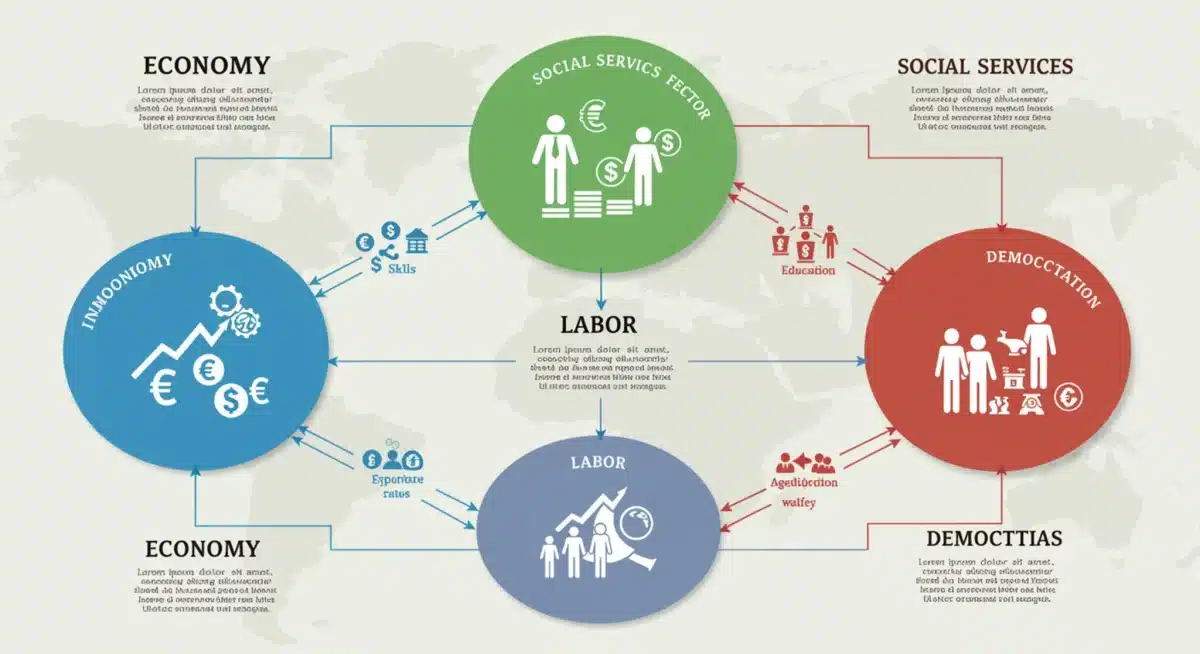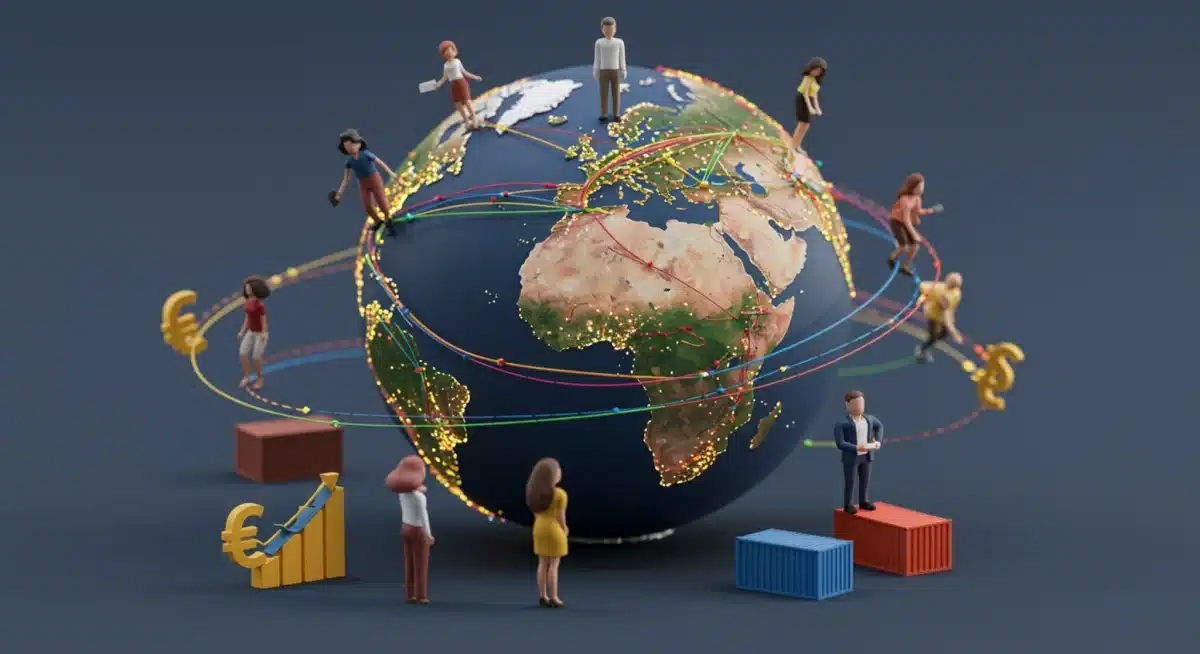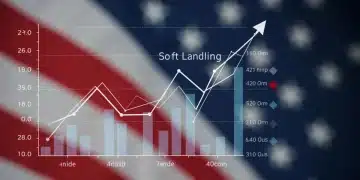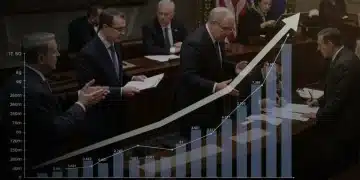Immigration Policy Changes: Potential Consequences Explored

Proposed changes to immigration policy could significantly alter the U.S. economic landscape, social fabric, and international standing, influencing labor markets, community integration, and diplomatic ties.
The landscape of immigration policy in the United States is constantly evolving, with recent discussions and proposals hinting at significant shifts. Understanding what are the potential consequences of the proposed changes to immigration policy is crucial for citizens, policymakers, and communities alike, as these shifts could profoundly impact various facets of American life.
Economic ramifications of immigration policy shifts
Any significant alteration to immigration policy inevitably sends ripples through the national economy. These changes can influence everything from labor supply and consumer demand to innovation and government revenue. The scope of these economic effects is broad, touching upon various sectors and demographics across the country.
Labor market dynamics and workforce impact
Immigrants often fill critical labor gaps, particularly in sectors such as agriculture, construction, healthcare, and technology. Proposed policy changes, especially those restricting legal immigration pathways, could lead to labor shortages in these essential industries. This scarcity might drive up wages in the short term for some positions, but it could also stifle growth and increase costs for businesses, potentially leading to higher prices for consumers.
- Reduced labor supply in key sectors.
- Potential wage increases for certain jobs.
- Increased operational costs for businesses.
- Slower economic growth due to labor constraints.
Conversely, policies that streamline immigration or expand pathways for skilled workers could bolster the labor force, fostering competition and potentially driving innovation. The impact on wages and employment for native-born workers is a complex issue, with various studies offering different perspectives depending on the specific policy and economic conditions.
Fiscal implications: taxes and public services
Immigrants contribute significantly to the tax base through income, sales, and property taxes, helping to fund public services. Changes that reduce immigration could lead to a decline in tax revenues. At the same time, the demand for certain public services might decrease in some areas, while in others, a reduction in the working-age population could strain social security and Medicare systems, which rely on a steady influx of younger contributors.
The fiscal balance is delicate. While some argue that immigrants place a burden on social services, many studies demonstrate that, over time, immigrants contribute more in taxes than they consume in benefits. The long-term fiscal health of the nation is intrinsically linked to its demographic trends, which immigration heavily influences.
In conclusion, the economic consequences of immigration policy changes are multifaceted. They can reshape labor markets, influence fiscal stability, and affect the overall trajectory of economic growth. Careful consideration of these dynamics is essential for policymakers.
Social and cultural impacts on American communities
Beyond economics, immigration policy plays a vital role in shaping the social and cultural fabric of the United States. Changes in these policies can lead to significant shifts in community demographics, cultural integration, and social cohesion, affecting how Americans interact and identify.
Demographic shifts and community integration
Altered immigration policies can accelerate or slow down demographic changes within communities. Reduced immigration might lead to an aging population in certain regions, impacting schools, healthcare systems, and local economies. Conversely, increased immigration can rejuvenate communities, bringing new families, businesses, and cultural perspectives.
The process of integration is also heavily influenced by policy. Policies that support integration, such as language programs and access to legal services, can foster stronger, more cohesive communities. Restrictive policies, however, might lead to more isolated communities, potentially increasing social tensions and hindering the mutual benefits of cultural exchange.
- Changes in local population age and composition.
- Impact on school enrollment and healthcare demand.
- Potential for increased or decreased social cohesion.
- Influence on cultural diversity and local traditions.
Cultural diversity and national identity
Immigration has historically been a cornerstone of American cultural diversity, enriching the nation with new traditions, cuisines, languages, and perspectives. Proposed changes that limit this inflow could lead to a more homogenous society over time, potentially diminishing the vibrant cultural tapestry that defines much of the U.S.
The debate over national identity often intertwines with immigration policy. Some argue that high levels of immigration challenge a unified national identity, while others contend that diversity is central to American identity. Policy decisions in this area reflect deep-seated societal values and can significantly impact how future generations perceive their nation’s heritage.

Ultimately, the social and cultural consequences of immigration policy changes are profound. They can reshape the very essence of American communities, influencing how people live, work, and interact, and redefining the nation’s cultural landscape for years to come.
Implications for international relations and global standing
Immigration policy is not solely a domestic issue; it also has significant repercussions on the United States’ standing in the international community. How a nation manages its borders and treats immigrants can profoundly influence its diplomatic relationships, soft power, and global reputation.
Diplomatic ties and international partnerships
Changes in immigration policy can strain or strengthen diplomatic relations with other countries, particularly those from which a significant number of immigrants originate. Restrictive policies might be perceived as unwelcoming or discriminatory, leading to diplomatic friction and potentially impacting trade agreements, security cooperations, and cultural exchanges.
Conversely, policies that are seen as humane, fair, and open can enhance the U.S.’s image as a global leader and a beacon of opportunity. This can foster stronger alliances and facilitate greater international collaboration on a range of issues, from climate change to public health. The perception of a nation’s immigration policies often becomes intertwined with its broader foreign policy objectives.
Human rights and global reputation
The treatment of immigrants and asylum seekers under new policies is often scrutinized by international human rights organizations and other nations. Policies perceived as violating human rights or lacking due process can severely damage the U.S.’s global reputation, impacting its moral authority on the world stage.
- Potential for strained relations with sending countries.
- Impact on international trade and security agreements.
- Influence on the U.S.’s image as a global leader.
- Scrutiny by human rights organizations.
The U.S. has historically been a destination for those seeking refuge and a better life, and this image is a crucial component of its soft power. Alterations to this image, particularly those that suggest a less welcoming stance, can diminish its influence and ability to advocate for human rights abroad.
In summary, immigration policy is a critical component of foreign policy. Its changes can either bolster or undermine the United States’ relationships with other nations, influencing its diplomatic effectiveness and its standing as a responsible actor on the global stage.
Impact on specific immigrant groups and their futures
Proposed changes to immigration policy rarely affect all immigrant groups equally. Specific alterations can disproportionately impact certain communities, creating distinct challenges and opportunities for their futures in the United States. Understanding these targeted effects is essential for a comprehensive analysis.
Asylum seekers and refugees
Policies concerning asylum and refugee status are often among the most contentious. Stricter criteria for asylum, reduced quotas for refugees, or changes in processing procedures can have immediate and severe consequences for individuals fleeing persecution or conflict. These changes directly impact their ability to find safety and rebuild their lives in the U.S.
Such policies also have broader humanitarian implications, potentially leaving vulnerable populations in precarious situations. The U.S.’s role as a haven for those in need can be significantly altered, affecting international efforts to address global humanitarian crises.
Skilled workers and family-based immigration
Changes to visa programs for skilled workers can influence the flow of talent into critical industries, impacting technological innovation and economic competitiveness. Policies that prioritize certain skills or educational backgrounds can reshape the composition of the highly skilled workforce.
Similarly, modifications to family-based immigration categories can affect family reunification, a cornerstone of U.S. immigration policy for decades. Longer waiting times or narrower eligibility criteria can separate families for extended periods, leading to social and emotional distress for those involved.
The impact on these groups is not merely administrative; it touches upon the core human experience of seeking opportunity, safety, and family connection. Policy decisions here have profound personal and societal ramifications.
Legal and administrative challenges of policy implementation
Implementing new immigration policies is a complex undertaking, fraught with legal and administrative challenges. The transition from policy proposal to practical application often reveals unforeseen difficulties, requiring significant resources and careful navigation of existing laws and bureaucratic structures.
Enforcement mechanisms and border security
Changes in policy often necessitate adjustments to enforcement mechanisms, particularly at the border. Increased border security measures, new surveillance technologies, or changes in detention policies can be costly and raise questions about civil liberties and due process. The effectiveness of these measures in achieving policy goals is also a subject of ongoing debate.
- Increased costs for border security infrastructure.
- Challenges in upholding civil liberties during enforcement.
- Potential for legal challenges to new enforcement tactics.
- Strain on administrative resources for processing and detention.
The legal framework surrounding immigration enforcement is intricate, with numerous precedents and constitutional considerations. Any new approach must withstand legal scrutiny, often leading to protracted court battles that can delay or alter implementation.
Bureaucratic burden and processing backlogs
Altering immigration laws can create substantial bureaucratic burdens for agencies like U.S. Citizenship and Immigration Services (USCIS) and Customs and Border Protection (CBP). New regulations require updated forms, training for personnel, and potentially new technological systems. This can lead to significant processing backlogs, impacting applicants and creating uncertainty.

The sheer volume of applications and cases handled by these agencies means that even minor policy adjustments can have cascading effects on processing times. Delays can have serious consequences for individuals awaiting status adjustments, work authorizations, or family reunification.
In essence, the path from policy conception to effective implementation is paved with legal hurdles and administrative complexities. These challenges can significantly influence the actual impact and success of any proposed changes to immigration policy.
Ethical considerations and human rights implications
At the heart of any discussion about immigration policy lies a complex web of ethical considerations and human rights implications. Policies are not just about numbers and economics; they fundamentally affect human lives, dignity, and aspirations. Examining these ethical dimensions is crucial for a just and humane approach to immigration.
Dignity, fairness, and due process
Every proposed change to immigration policy must be evaluated through the lens of human dignity and fairness. Are the policies designed to treat all individuals with respect, regardless of their origin or legal status? Do they uphold the principles of due process, ensuring that individuals have a fair hearing and access to legal recourse?
Policies that lead to family separation, prolonged detention without clear justification, or inadequate access to legal representation raise serious ethical concerns. These practices can inflict lasting trauma and undermine the foundational values of justice and equality.
- Ensuring humane treatment for all individuals.
- Upholding due process rights for immigrants.
- Addressing the ethical implications of family separation.
- Providing adequate access to legal counsel.
Moral obligations and international law
As a signatory to various international human rights treaties, the United States has moral and legal obligations to protect the rights of migrants, refugees, and asylum seekers. Proposed policy changes must align with these international commitments, ensuring that the nation upholds its responsibilities on the global stage.
Ignoring international norms or withdrawing from treaties can have significant ethical costs, not only for the individuals directly affected but also for the U.S.’s standing as a proponent of human rights worldwide. The moral leadership of a nation is often judged by how it treats its most vulnerable populations.
Ultimately, the ethical framework underpinning immigration policy is paramount. Decisions made in this area reflect a nation’s values and have profound implications for human rights, both domestically and internationally. A humane and just approach requires careful consideration of these ethical dimensions.
| Key Impact Area | Brief Description of Consequences |
|---|---|
| Economy & Labor | Affects labor supply, wages, consumer demand, and fiscal contributions. |
| Social & Cultural | Influences demographic shifts, community integration, and cultural diversity. |
| International Relations | Impacts diplomatic ties, global reputation, and human rights standing. |
| Legal & Ethical | Creates administrative challenges and raises concerns about dignity and due process. |
Frequently asked questions about immigration policy changes
Changes could impact labor supply in sectors like agriculture and tech, potentially leading to shortages or wage shifts. They also influence tax revenues and demand for public services, affecting overall economic growth and fiscal stability.
Stricter policies can lead to demographic shifts, impacting community integration and cultural diversity. They might foster isolation among immigrant groups and alter the social fabric of American towns and cities.
Immigration policies can strain or strengthen diplomatic ties with other nations, influencing trade, security partnerships, and the U.S.’s global reputation. Perceived human rights violations can also damage international standing.
Yes, policies often disproportionately impact asylum seekers, refugees, skilled workers, and those seeking family reunification. Changes to visa categories or asylum criteria can significantly alter their pathways to residency and safety.
Key concerns include upholding human dignity, ensuring due process, and addressing potential family separations. Policies must also align with international human rights obligations to maintain the nation’s moral authority.
Conclusion
The proposed changes to immigration policy in the United States represent a pivotal moment with far-reaching implications across economic, social, international, and ethical dimensions. From reshaping labor markets and community demographics to influencing diplomatic relations and human rights, the consequences are complex and interconnected. A thorough understanding and careful consideration of what are the potential consequences of the proposed changes to immigration policy are essential for crafting policies that not only serve national interests but also uphold fundamental values and foster a just society for all.





